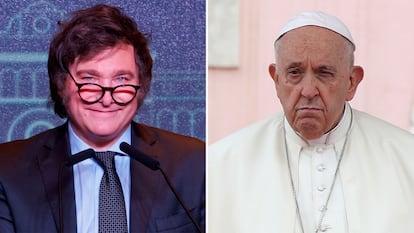Pope Francis takes on the far-right
The pontiff trends on social media for his views on the far-right after Milei’s victory in Argentina, the Israeli-Hamas war, and a trans group’s visit to the Vatican

Some people say Pope Francis is a communist, to which the Argentine Jesuit replies: “Look, I am defined by Matthew 25. Read chapter 25 of the Gospel of Matthew, and then tell me if the person who spoke those words is a communist. Who will enter the kingdom of Heaven? I was hungry and you fed me; I was thirsty and you gave me something to drink; I needed clothes and you clothed me… These are the things we are commanded to do.” In an interview seven months ago with journalist Gustavo Silvestre for the C5N Argentine television channel, the pope quoted the Gospel of Matthew to emphasize the importance of social justice as a response to the far-right. The interview has resurfaced and is trending on social media after the Pope’s comments on victims of the Israeli-Hamas conflict: “This isn’t war anymore, it’s terrorism.” Another flash point is the pope’s recent invitation to a transgender group for lunch at the Vatican.
Pope Francis, born Jorge Mario Bergoglio, highlighted the Nazi regime’s ascent to illustrate the threat posed by the far-right. He described this type of extremism as a “centripetal” force that consistently regroups and hinders attempts at reform. “I recommend reading Sindrome 1933, [an Italian book] that reveals the tremendous nationalism that existed in Germany. They couldn’t find anyone to move the nation forward, until a new politician arrived. He had a way with words and managed to win people over. His name was Adolf, and everyone thought, ‘Let’s give this guy a chance since he’s unknown and doesn’t have any baggage.’ They voted for him, and you know the rest. I’m wary of leaders without a track record, so when someone like that comes along, it’s best to be cautious,” said the pope, who never mentioned the name of the president-elect of his native Argentina. Certain people on X (formerly Twitter) seized the opportunity to criticize the Vatican’s inaction during the Nazi era.
Before his electoral victory, Javier Milei also cited scripture (the Gospel of Luke) to support his case. He said the pontiff was the “earthly representative of evil” and accused him of aligning with communists and oppressive regimes. Milei lambasted the pope’s stance on social justice, which he called nothing but legal theft. Perhaps the weight of his new office and realpolitik ultimately prevailed, or maybe his conservative backers have simply toned down their rhetoric. After the election, Milei told La Nación+ that he recently had a conversation with the pope, whom he considers “the most important Argentine in history.” He said he had a pleasant chat with “His Holiness,” the man he once called the “imbecile in Rome.” The pope congratulated Milei on his victory, who cordially invited him to visit Argentina.
At 88 years old, the leader of the Catholic Church has a complex relationship with certain members of his flock. After remarks made at the Vatican concerning the baptism of transgender individuals, many disaffected Catholics posted comments like, “Claiming the ‘love of God,’ the West is actually normalizing this degeneration”; “What has become of the Catholic Church?”; and “Europe turns Islamic and Pope Francis invites a transgender group for lunch at the Vatican.”
The pope’s words equating the Hamas attack and Israel’s response have sparked numerous online debates, editorials and reports encompassing a wide range of perspectives: “You know what’s really striking? It’s not just the pope’s words, but the fact that it’s considered news to speak the truth about the genocide in Gaza”; “I didn’t really expect much from an anti-Semitic racist”; and “It’s called state-sponsored terrorism.”
Sign up for our weekly newsletter to get more English-language news coverage from EL PAÍS USA Edition
Tu suscripción se está usando en otro dispositivo
¿Quieres añadir otro usuario a tu suscripción?
Si continúas leyendo en este dispositivo, no se podrá leer en el otro.
FlechaTu suscripción se está usando en otro dispositivo y solo puedes acceder a EL PAÍS desde un dispositivo a la vez.
Si quieres compartir tu cuenta, cambia tu suscripción a la modalidad Premium, así podrás añadir otro usuario. Cada uno accederá con su propia cuenta de email, lo que os permitirá personalizar vuestra experiencia en EL PAÍS.
¿Tienes una suscripción de empresa? Accede aquí para contratar más cuentas.
En el caso de no saber quién está usando tu cuenta, te recomendamos cambiar tu contraseña aquí.
Si decides continuar compartiendo tu cuenta, este mensaje se mostrará en tu dispositivo y en el de la otra persona que está usando tu cuenta de forma indefinida, afectando a tu experiencia de lectura. Puedes consultar aquí los términos y condiciones de la suscripción digital.









































